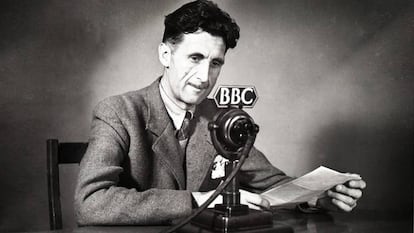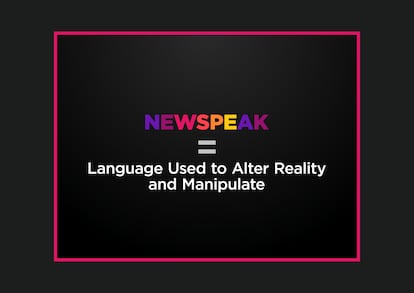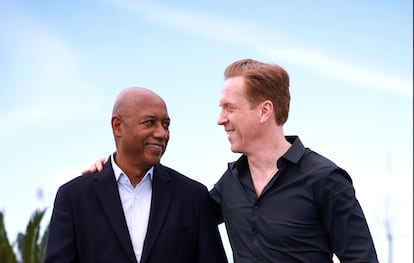“How many fingers do you see?” Winston Smith, the protagonist of 1984answer what your eyes indicate: there are four. Only the party agent who directs his reeducation insists that there are five. By force of electric shocks and several forms of torture, it begins to doubt its own perception, until at the end of the book he also distinguishes them: there are five, there is no doubt. That passage of the great dystopian novel by George Orwell, in which the truth gives in the face of the pressure of power, gives rise to the new documentary of Raoul Peck (port prince, Haiti, 71 years), Orwell: 2+2 = 5presented in the Cannes Première section of the Festival.
That scene is the symbol that Peck has chosen to describe a society in which Orwell’s theses are no longer future forecasts, but pure reality. His vision, cemented on concepts such as Big Brother, Neolengua, Doublepensar o Cropa present marked by constant surveillance, social fear and collapse of the notion of truth. Narrated by actor Damian Lewis, the documentary intertwine texts and letters of orwell with file photographs, fragments of the cinematographic adaptations of 1984 (that of 1956, with Edmond O’Brien, and that of 1984, with John Hurt), scenes of other films, of Oliver Twist a Notting Hill (!), And images extracted from television and social networks.
For Orwell, every project began with a feeling of injustice he wanted to face. For fish it is not very different. From his first short film, on the visit of Cuban troubadour Carlos Puebla to the Berlin of the Cold War, to his films about James Baldwin (I Am Not Your Negro) or South African photographer Ernest Cole, released last Friday, his cinema has followed a clear and coherent political line. “I come from Haiti. From very early I saw the hypocrisies of those who proclaim defenders of democracy. And I am a black person: I faced societies who had decided that I had no right to exist,” says the director on a terrace overlooking the port of Cannes.
Peck, who grew up under several liberticidal regimes – that of François Duvalier in Haiti, and Mobutu Sese Seko during his exile in Zaire – and saw his imprisoned father as an opponent, he understood from a young age the importance of raising his voice when everyone is silent. “Orwell said: hope, if it exists, you have to build it. It does not appear alone. In the history of humanity, that has never worked. Resist, you organize, make it happen. Authoritarian regimes fall because they lose a war or explode a revolution. It may take five years or 30, but the same thing always happens: the collapse system or citizens resist.” In that sense, his film seems like a call to action. “It’s not my role, but I want each citizen to wonder: what do I do in this world? At least, who have the privilege of considering it. A child born in the south of the Congo, who works in a mine so that you have an iPhone, does not have that option. But maybe you do have it …”.
More than a biography to use, the documentary remembers Orwell in his last years of life. Sick of tuberculosis and isolated on a remote farm of the Scottish island of Jura, he insisted on finishing 1984 Before it was too late. His literary will was published in 1949, only six months before his death. Peck takes as a starting point the famous motto of the party that structures the novel: “War is peace. Freedom is slavery. Ignorance is strength.” And it makes it the instrument to examine how fascism threatens to return throughout the world. Putin, Netanyahu, Milei and Meloni parade for their images, although the great protagonist is Donald Trump, for discounted, and his systematic contempt for the truth.

Orwell knew well the mechanisms of oppression. He observed them in Europe, fighting with the international brigades in the Spanish Civil War, but also exercised them: He was born in colonial India, son of a British official of the Opium department, and worked for five years as an imperial police officer in Burma. Both experiences aroused in the writer a visceral rejection of authoritarianism and a deep feeling of guilt. Once he wrote that, without the Empire, Great Britain would be nothing more than “a cold and irrelevant Islite, fed based on herring and potatoes”, another observation that already touched the prophecy.
“One of the things that approached Orwell the most when I started reading was feeling that someone in the Third World seemed, like me. It seemed close, someone who understood me, like a brother,” says Peck, politicized in the leftist circles of the Berlin of the seventies. “I arrived there with 16 years and discovered a world dominated by resistance. The city was a political hotbed. My generation studied in Europe to return to their countries, fight and, if necessary, die. It was not about having a race, a house or a car. That was not our model. We struggled to end authoritarianism.” Is that what is still doing today, through your films? “Unfortunately, yes.”

One of the most fascinating parts of the documentary is the one dedicated to the Neolengua, that language designed to limit critical thinking through prefabricated euphemisms and phrases. “It is as if new words were added to the great dictionary of the Neolengua. New words, yes, but that they always fulfill the same function: to avoid that people face reality.” In the documentary, Peck lists a long series of recent examples, such as “Special Military Operation” (War), “Legal use of force” (police violence), “cuts” (reduction of social programs) or “fiscal optimization” (tax evasion). And an even more controversial: “anti -Semitism”, used to “delegitimize any criticism of the military actions of the state of Israel,” says Patch, a complaint received with applause at the premiere of the Cannes film. “I do not say that there is no anti -Semitism, but that is something else. And that nobody comes to say that I am ambiguous. Most of my films have talked about the Holocaust,” he defends himself.
For the director, the oppressed are always right, as Orwell argued? “Fundamentally, yes. But that does not mean that all the methods support. For example, I do not support Hamas or its policy. Support resistance, because it is a people occupied by another, but not that way of fighting,” says Petk. For him, terrorism does not arise from nothing: it appears when the other ways have failed. “No one is born with an explosive belt. When a human being takes everything – his identity, his dignity, the possibility of surviving – you make it an animal. That was what the Nazis did with the Jews: to turn them into insects or rats. Desp Hell. If they survive, what are they going to become? And, suddenly, two plus two are four again.

